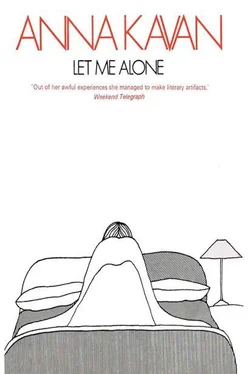When Anna looked at him, she saw only his innocence, his extraordinary, naive unawareness, as though he had really forgotten. And the look of anxious reproach in his eyes which seemed to put her in the wrong. She did not know what to believe.
‘How could you go off like that?’ said Matthew, his eyes reproachful. ‘I’ve been dreadfully worried. Port Said is no place for a woman alone.’ He really seemed to think she was in the wrong.
Findlay wandered away. When Anna was alone with Matthew he still maintained his injured, innocent behaviour.
‘Why did you do it?’ she said, staring at him coldly. ‘Why did you take me to that horrible place?’
‘Why did you run away?’ he retorted. He avoided the issue entirely. He would not answer her. And she knew that he never would answer. Impossible to get anything out of him. Perhaps he really failed to hear her question, or failed to understand. The impossibility of communication with him made her feel hopeless. She looked at his face. It was brown and blank.
‘We must go back to the boat,’ he said. ‘We must get a gharri.’
A carriage was called and they got in. Anna made one more attempt.
‘I want to know what your idea was in taking me to that beastly place,’ she said. Her eye was stony.
Matthew sat beside her listening to her question, to her voice of cold inquiry. He did not seem to hear. He seemed to hear only what he wished, to understand only what was acceptable to him. You might question him for a year and a day and he would never hear you — unless he wanted to hear.
Anna felt this, and gave it up. She was quite bewildered. She could not reconcile the Matthew who had inflicted the nightmare upon her with the innocent Matthew who came afterwards. She did not know which to believe in. Nevertheless, she knew he was more of a nonentity to her than a nightmare. He would never become important. He was not real. She looked at him with a certain horror and apprehension, at his close, round, meaningless head bobbing in her direction. She hurried away as soon as she could. But he was not really of any importance, although she found him repugnant.
The voyage went on, the Port Said incident dropped out of sight and was more or less forgotten. Matthew stuck closer to Anna. It seemed now that he had to be always with her. His popularity among the lady passengers was on the wane for some reason. Perhaps they had tired of his somewhat insipid attractions and had begun to see through him. Or perhaps it was he himself who had changed, growing less gratifyingly obliging. He was rather touchy these days; he started to quarrel with the men, to take offence at everything. He seemed to have developed a childish fear of being ‘left out.’ And so, of course, he was left out. And so he turned back to Anna, and would not leave her. Which was distinctly trying.
Not that he interfered particularly. But he was always hanging round her deck-chair, urging her to partner him in the games, and, when she refused, sitting down beside her with his dumb, stonelike obstinacy and a rather martyrized expression.
Anna would not play in the games. Not so much because she disliked the games themselves — certainly they were inane and boring enough, but then the whole shipboard life was such a madness of inanity that the lesser, incidental imbecilities were excusable — but because she could not endure the determinedly jovial attitude which everyone adopted towards the skittle contests and the quoits and the deck-tennis and deck-everything-else. ‘Let’s get up a cheery party.’ ‘Let’s collect a cheery crowd.’ There was something about the very sound of the word ‘cheery’ that set her teeth on edge with repulsion. All this fizz of jovialness left her cold. She was somewhat contemptuous, somewhat dazed in the society of all these jolly good fellows who treated her to their peculiar mixture of gallantry and effrontery and mock-deference — all overlying, in some way, a fundamental slight. Presumably the slight was unconscious and unintended; but it was there, none the less. A kind of masculine all-highest condescension to which the other women played up disgustingly. The flighty feminine dove-cote always seemed to be in a flutter of coquettish excitement over some fine gentleman. It was the sort of atmosphere which one expects to meet in mid-Victorian fiction. But it had a central nullity particularly its own. Underneath the superficial cheeriness and the little flirtatious excitements was a sort of flatness, an emptiness. As though at any moment the whole system might collapse into a black abyss of vacancy.
Anna found it all rather depressing. However, she sat calmly in her chair, and watched the slow, hot passage of the hours, and felt uneasy and dubious. A horrible empty feeling she had. And lonely, as if the universe were tumbling down in a watery swirl, and she alone stood solid on her solitary peak. The horizon was like a ruled line, clean-cut and rigid, cutting the world in two. The upper half, the sky, pale ultramarine; the lower, the watery half, cobalt, or sometimes prussian-blue with streaks of purple in it. The empty, empty world of water and blueness! In her eye came an ache like nausea, craving so keenly the relief of solidity. She wanted so much to find something to catch hold of. But what was there?
The days went by, and they were at Colombo — the voyage was ending. She came up on deck one morning, very early, and saw the land, a tremulous, rosy scarf floating on the blue rippling water, but pearly, pearly, a very precious and diaphanous thing, lucent and phantasmal. She remembered that Ceylon was called the pearl-drop of India. And there it was, the pearl, before her eyes.
Many passengers were leaving the boat, Findlay among them. Matthew and Anna went ashore with him. They had arranged to make an expedition together, a sort of farewell party. They would drive to Mount Lavinia, dine and stay the night. It was not necessary to return to the ship till the following day.
Anna was very excited. It was dry land, solidity at last. She was in the East, in the great continent of ancient Asia, with the hot earth underfoot. And really, in the blue and glittery atmosphere, in the reckless, transparent flood of sunshine, in the hot dazzle of buildings, and palm trees bursting up, there was something different, something romantic. And the fantastic figures of the men going about, so womanish with their coloured skirts and their long black hair turned up in a bun or swathed round a tortoiseshell comb — altogether womanlike until you saw their smallish, metallic faces which had a curious small-scale maleness of their own, a sort of masculinity in minature. Like men dressed up as women in a pantomime they were, after you had seen their male faces. Anna was exhilarated.
In the afternoon they motored into the country, in a whirl of dust and palms and scarlet and vivid green, and chickens scattering at the sides of the roads — all rather gaudy and unconvincing, like a pantomime. There was even a glimpse of elephants solemnly trundling. Then, in the evening, a hotel by the sea, gardens, people bathing, and palm trees darkly leaning over the pale sand.
Anna was very aware of Findlay. But what did she feel about him? She looked at him to find out. He smiled at her. And the blood stirred in her veins. This was her response, but what did it mean? She was on the alert for him, she wanted to make contact.
But she could not speak to him. There was no opportunity. The presence of Matthew and of the other people was like a wall of rock round her. She hated them. In a fury of intolerance her grey eyes looked out at them. But she gave no sign. She sat quietly, concealed and secret behind her smiling face. So the whole evening passed without any trace of intimacy. Findlay and Anna were like affable, shipboard acquaintances taking leave of each other. Matthew sat near Anna and refilled her glass. And as she drank she began to grow angry. A sort of shame was at the root of her anger, her heart was cold. She looked at Findlay with a smiling, cold face which he seemed not to see. Then, laughing, saying that they must go and look at the moon, he led the way out of doors.
Читать дальше












